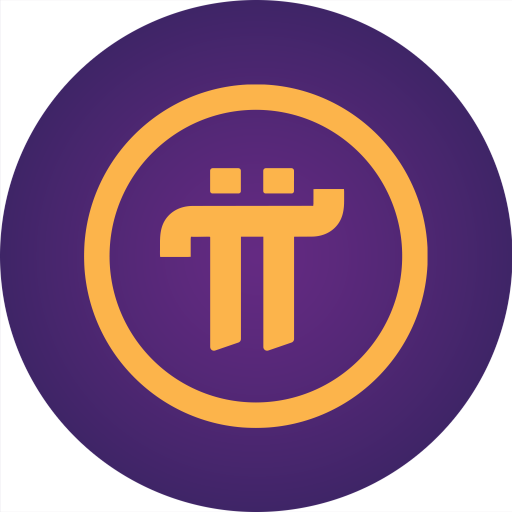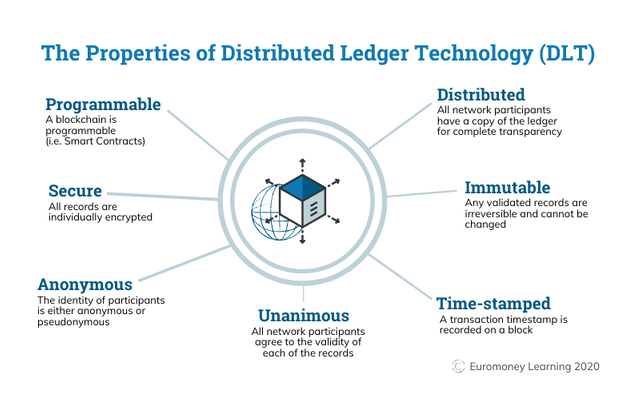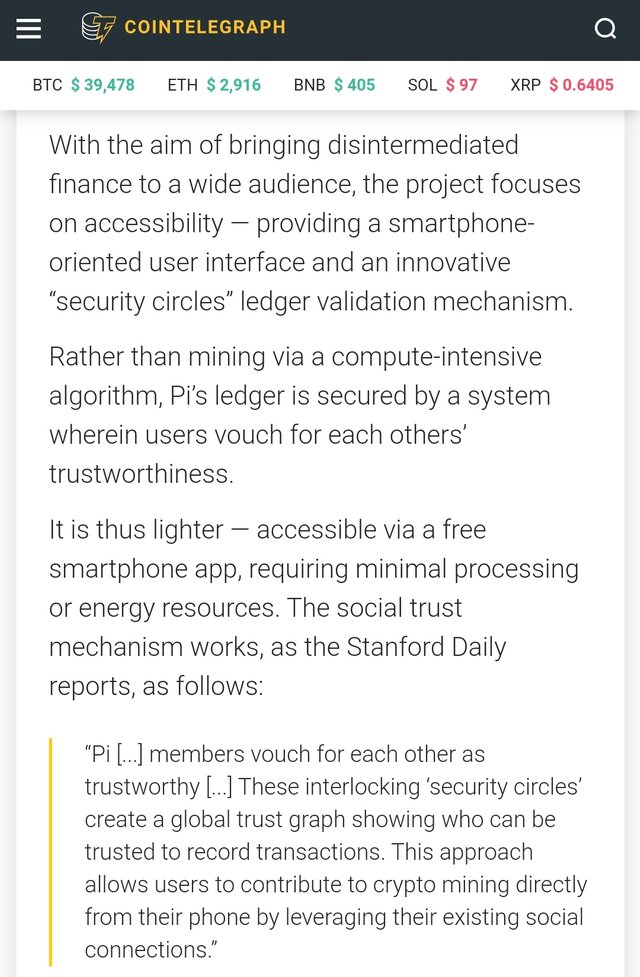About Blockchain Technology
Dr Hayes notes that a blockchain is a distributed database that is shared among the nodes of a computer network which guarantees the fidelity and security of a record of data and generates trust without the need for a trusted third party. Hayes further noted that unlike conventional databases, a blockchain collects information together in groups, known as blocks. These blocks in turn have certain storage capacities which when filled, causes the block to be closed and linked to the previously filled block, thus forming a chain of data; the blockchain. All new information that follows that freshly added block is compiled into a newly formed block that will then also be added to the chain once filled as well.
Generally, blockchain is a type of distributed ledger technology (DLT) which records transactions with an immutable cryptographic signature called a hash. This system of recording information makes it difficult or impossible to change, hack, or cheat the system.1
The beauty of Blockchain technology lies in the many advantages it has over conventional data management. Pratt (2021), using information from selected experts, identified the following to be among the outstanding benefits of Blockchain technology:3
- Speed: By eliminating middlemen and the resulting redundancies, blockchain handles transactions significantly faster than conventional databases.
- Immutability: Any transactions recorded on the blockchain can not be changed or deleted. These transactions are timestamped and date-stamped to provide a permanent record.
- Trust: Blockchain enables trust between participants who do not know each other but yet still had to share data or payments. As a result, these entities are willing to engage in business dealings that involve financial transactions or data sharing, which they may not have otherwise done or would have required a trusted or trustworthy intermediary to do so.
- Improved security and privacy: Blockchain creates an imutable or unalterable record of transactions with end-to-end encryption using cryptography, which shuts out fraud and unauthorized activity. Another thing that enhances the security of Blockchain technology is the fact that unlike conventional databases whose data is on a single computer server, data on the blockchain is stored across a network of computers, making it nearly impossible to hack.
- Decentralized structure: Blockchain enables sharing of data within an ecosystem of businesses without the need to have an entity exclusively in charge.
- Reduced costs: Blockchain technology reduces the manual tasks of data processing, reporting and auditing, thus eliminating the additional cost of hiring middle men for such tasks.
My Favourite Blockchain Network
.png)
On March 14, 2019, Pi Network, the first blockchain encrypted digital asset that ordinary people can own at zero cost, was born at Stanford University in the United States. It was founded by Chengdiao Fang (an Anthropologist), Nicholas Kokkalis and Aurelien Schiltz (Computer Scientists), and Vince McPhilip (a Business Major). The Pi Network is a digital currency project that aims to keep cryptocurrency mining accessible to everyday users devoid of the challenges posed to the environment and the high cost of equipment which is typical of first generation networks like bitcoin, which puts mining them beyond the reach of everyday users. To hear from the horse's mouth, Marie Huillet provides the following captured information in coin telegraph:
Since the objective of the Pi Network was to Build a cryptocurrency and smart contracts platform secured and operated by everyday people,
Pi’s consensus algorithm builds atop Stellar Consensus Protocol (SCP) which has been formally proven and is currently implemented within the Stellar Network. Pi allows devices of individuals to contribute on the protocol level and get rewarded, everyday mining. There are four roles Pi users can play, as Pi miners. The white paper lists these roles to include:
Pioneer. A user of the Pi mobile app who is simply confirming that they are not a “robot” on a daily basis. This user validates their presence every time they sign in to the app. They can also open the app to request transactions (e.g. make a payment in Pi to another Pioneer)
Contributor. A user of the Pi mobile app who is contributing by providing a list of pioneers he or she knows and trusts. In aggregate, Pi contributors will build a global trust graph.
Ambassador. A user of the Pi mobile app who is introducing other users into Pi network.
Node. A user who is a pioneer, a contributor using the Pi mobile app, and is also running the Pi node software on their desktop or laptop computer. The Pi node software is the software that runs the core SCP algorithm, taking into account the trust graph information provided by the Contributors.
A user can play more than one of the above roles. All roles are necessary, thus all roles are rewarded with newly minted Pi on a daily basis as long as they participated and contributed during that given day. In the loose definition of a “miner” being a user who receives newly minted currency as a reward for contributions, all four roles are considered to be Pi miners.
Fast forward to this moment, some of the early pioneers and contributors of the Pi Network have downed their shovels, taking a well deserved break from the daily mining ritual.
🙆🙆 Oops, I forgot to mine Pi today. Lemme check... Okay, done👍 Now lemme answer some of the key questions raised:
What makes this Blockchain Network my favourite?
First, it makes users feel like important players in the ecosystem as they can all make important contributions to the security and stability of the Pi Network. 😎🥸
Secondly, nothing feels more fun than the vaguely felt sense of purpose and direction mining pi everyday brings....to over 30 million innocent crypto adopters who hope on the success of the Pi Network. These humble folks wake up everyday with 1 task already planned, prioritized, and with a reminder: Don't forget to mine PI! 😂😂
Does the network has some earliest shortcomings and how has the network's team taken care of the problem?
The Pi Networks most significant drawback in its early days was the use of only mobile devices for mining. This made it very stressful for contributors to maintain their account on the network on the event of loss of mobile device to theft or other forms of damage. This issue, the developers have been able to address with the launch of the PI browser as well as the launch of the mainnet. This allows contributors to more effective access their tokens and mining account without such worry of loss.
What changes do you think would make the network better?
The PI Network has already been able to engage millions of contributors in a cost friendly way. I personally believe that the network would be even more friendly if it allows users to automate their mining ritual for multiple days at a time, instead of reactivating it every 24 hours. Moreover, the earlier the mined tokens are exchangeable for other crypto tokens, the better for the community as more and more pioneers are losing their initial zeal in the mining protocol due to the fact that they rewards are still futuristic and vague.
Write about a Project that is built on your favorite Blockchain.
One of the projects built on the Pi Network which is an innovative game changer in the crypto industry is the decentralized identity verification (Know Your Customer [KYC]) solution developed by PI Network pioneers. This is a decentralized KYC solution that is self-sufficient within the ecosystem (whatever that means 🙆, seems like a big deal tho). My honey take is that this decentralized KYC solution presents a real potential for the fastest and most reliable KYC solution ever. More information in this KYC innovation can be found here
Conclusion
Don't forget to mine PI! 👍
.
.
.


A lot of people see Pi as a joke but if you conside it as your favourite based on the reasons given, you're good to go.
Downvoting a post can decrease pending rewards and make it less visible. Common reasons:
Submit
Hi @nsisong99 wow what a choice? I use to think Pi was a joke.
I mined but then changed my mind later and stopped. Don’t get me wrong
I’m persistent but I just didn’t see much potential or sort. But who knows the future.
Best wishes
Downvoting a post can decrease pending rewards and make it less visible. Common reasons:
Submit
Pi Network. am not really familiar with such a Blockchain network, but with the help of your post, i now understand the pi Network and how it works, good post, keep it up
Downvoting a post can decrease pending rewards and make it less visible. Common reasons:
Submit
Thanks for your response and upvote @rad-austine I believe that of the PI team continue to make their dream come true, the PI Network would become a big gift to the common member of every society.
Downvoting a post can decrease pending rewards and make it less visible. Common reasons:
Submit
Honestly speaking i haven't heard about it earlier . It is through your post that I got to learn many new things .
I couldn't understand what it is all about. Kindly enlighten ?
Thanks
Downvoting a post can decrease pending rewards and make it less visible. Common reasons:
Submit
@drqamu thanks for your reply and upvote. I'm glad the post got you curious to know more. I have added a link for more information in this purportedly innovative KYC solution by the PI team. I'm sure it explains it better than I may attempt. Please read it up here
Downvoting a post can decrease pending rewards and make it less visible. Common reasons:
Submit
Thank you for publishing an article in the Crypto Academy community today. We have accessed your article and we present the result of the assessment below
Comments/Recommendation
Total|7/10
Downvoting a post can decrease pending rewards and make it less visible. Common reasons:
Submit
Thanks so much for your work. And I must say I was going easy in the KYC in order not to commit any technical blunder, as my knowledge of it's functionality is not so vast. However, I have now added a link to an external resource that espounded it more thoroughly. I hope that helps.
Downvoting a post can decrease pending rewards and make it less visible. Common reasons:
Submit
KYC also known (Know your customer) is a security verification step. If Pi network introduced a KYC, it means they added a verification measures to know the users well. Users are often required to carry out this verification using a national identity card or international passport. KYC is not a project.
Downvoting a post can decrease pending rewards and make it less visible. Common reasons:
Submit
You find nothing away from convention in the way KYC is done for the Pi Network? I think you missed something in the additional information I added. Or maybe the Pi team are blowing something out of proportion with the ideas of decentralization and scale of verification possible per time. Or yet still, I might be expecting too much from this project. In any event, we look forward to seeing what becomes of this people's blockchain.
Downvoting a post can decrease pending rewards and make it less visible. Common reasons:
Submit